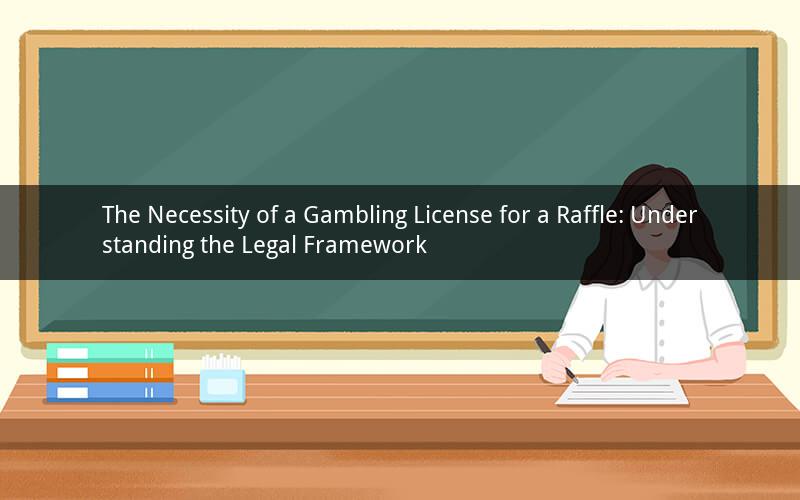
In the realm of fundraising events, raffles have long been a popular choice for organizations seeking to raise funds. However, the question of whether a gambling license is required for a raffle has often been a topic of debate. This article delves into the legal requirements surrounding raffles and the necessity of obtaining a gambling license for such events.
The Legal Perspective
1. Definition of a Raffle
A raffle is a contest in which participants purchase tickets for the chance to win prizes. The prizes are usually donated by individuals or businesses, and the proceeds from the tickets go towards a charitable cause. Raffles are commonly conducted by non-profit organizations, schools, and other community groups.
2. The Role of Gambling Licenses
Gambling licenses are legal permits granted by government authorities to entities engaged in gambling activities. These licenses ensure that gambling operations comply with state and federal regulations, including the prevention of money laundering, underage gambling, and organized crime involvement.
3. The Necessity of a Gambling License for a Raffle
The necessity of a gambling license for a raffle depends on various factors, such as the jurisdiction, the nature of the event, and the prizes involved. In some cases, a gambling license may not be required, while in others, it may be mandatory.
a. Jurisdictions without Specific Raffle Regulations
In jurisdictions that do not have specific raffle regulations, a gambling license may not be required. For example, in the United States, many states have no specific licensing requirements for raffles conducted by non-profit organizations. However, organizers should be cautious and consult with local authorities to ensure compliance with any applicable general gambling laws.
b. Jurisdictions with Raffle Regulations
In jurisdictions with specific raffle regulations, the necessity of a gambling license for a raffle depends on the type of raffle being conducted. Here are some scenarios:
- Charity or Non-Profit Raffles: In some cases, charity or non-profit organizations may be exempt from obtaining a gambling license for their raffles. This exemption is often contingent on certain conditions, such as the proceeds going towards a charitable cause or the prize value not exceeding a specific amount.
- Commercial Raffles: In contrast, commercial raffles conducted for profit typically require a gambling license. These events may include raffles organized by businesses or events that involve significant prize values.
4. The Benefits of Obtaining a Gambling License
Even if a gambling license is not mandatory for a raffle, obtaining one can offer several benefits:
a. Legal Compliance: Ensuring compliance with gambling regulations helps protect the integrity of the event and reduces the risk of legal action or fines.
b. Trust and Credibility: Displaying a gambling license can enhance the credibility of the event and build trust among participants, sponsors, and donors.
c. Enhanced Revenue Potential: Some sponsors may be more inclined to support an event that has a gambling license, as it demonstrates a commitment to legal compliance.
d. Access to Additional Prizes: Some prize suppliers may require a gambling license to provide certain high-value prizes.
Frequently Asked Questions (FAQs)
1. What is the definition of a raffle?
A raffle is a contest where participants purchase tickets for the chance to win prizes, with the proceeds typically going towards a charitable cause.
2. Is a gambling license always required for a raffle?
No, the necessity of a gambling license for a raffle depends on the jurisdiction and the nature of the event. In some cases, a gambling license may not be required, while in others, it is mandatory.
3. Are non-profit organizations exempt from obtaining a gambling license for their raffles?
In some jurisdictions, non-profit organizations may be exempt from obtaining a gambling license for their raffles, as long as the proceeds go towards a charitable cause and certain conditions are met.
4. Can a raffle conducted by a business for profit require a gambling license?
Yes, commercial raffles conducted for profit typically require a gambling license, as they are not exempt from gambling regulations.
5. What are the benefits of obtaining a gambling license for a raffle?
Obtaining a gambling license can help ensure legal compliance, enhance trust and credibility, increase revenue potential, and provide access to additional high-value prizes.
In conclusion, the necessity of a gambling license for a raffle depends on the jurisdiction, the nature of the event, and the prizes involved. Organizers should carefully assess their legal obligations and consider the benefits of obtaining a gambling license to ensure a successful and legally compliant fundraising event.